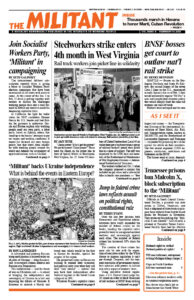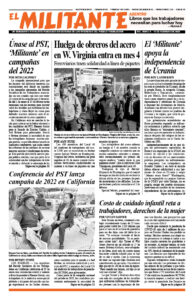With the threat of Moscow’s troops crossing the border against the people of Ukraine — launching the first serious land war on European soil in decades — class conscious workers worldwide side with the long fight of Ukrainian toilers for independence and sovereignty. The right of oppressed nations to self-determination, including independence, has been an important part of the program of the international communist movement for over 150 years.
For centuries the Ukrainian people were under the boot of Russia’s czarist rulers to the north. The Ukrainian people won independence briefly during the first few years of the 1917 Russian Revolution, as V.I. Lenin and the Bolsheviks fought for a voluntary Union of Soviet Socialist Republics that respected the Ukrainian people’s autonomy and the advance of the Ukrainian language and culture. After Lenin’s death, Joseph Stalin led a bloody counterrevolution, reimposing Great Russian national chauvinism, along with brutal policies that led to what Ukrainians know as the Holodomor, where millions perished of starvation. An independent Ukraine only reemerged on the heels of the breakup of the Soviet Union in 1991.
In 2014 a popular mass Maidan uprising in Ukraine battled in the streets and overthrew the pro-Moscow regime of Viktor Yanukovych. Millions joined the political struggle, gaining in confidence as they fought Moscow’s plans to reimpose domination over the country. The struggle gave impetus to the national struggle of the Tatar people in Crimea.
Russian President Vladimir Putin responded by seizing the Crimean Peninsula and backing a long, bloody proxy war by separatists in eastern Ukraine. That crisis has deepened a sense of Ukrainian national identity among working people across the country.
Mustafa Dzhemilev, a long-time leader of the Crimean Tatar people, explained that this was the way “society consolidates and a nation emerges.” He noted that Ukrainians had “united, regardless of origin or faith.”
The Maidan victory gave a spur to working-class struggles that still resonate today in the coal and iron ore mines, steel mills, railroads and other industries across Ukraine.
Putin justifies Moscow’s threats against Ukraine sovereignty with claims Russians and Ukrainians belong to “one people,” and that “true sovereignty of Ukraine is possible only in partnership with Russia.”
He says he stands on the legacy of the czarist empire, which imposed what Lenin dubbed “a prison house of nations” in Russia. And he claims the Bolshevik Revolution and Lenin’s policy on the national question were the worst disaster that ever befell Russia.
Despite the face of capitalist rule in Ukraine today — a challenge working people will need to take on — workers and farmers there are determined to fight to defend their independence from Moscow and their sovereignty.

